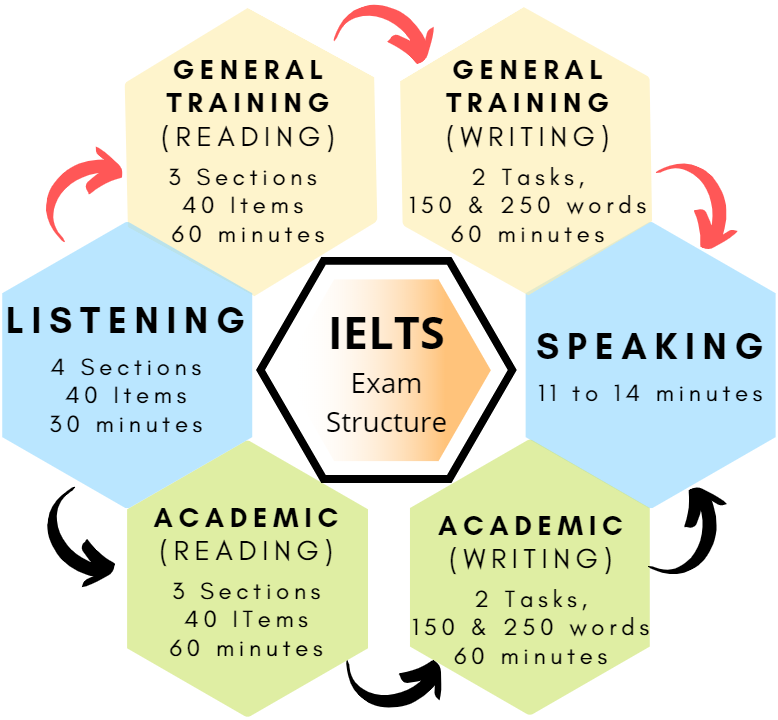Each year approximately 5 million people from 140 different countries around the world take IELTS exam. This exam is not difficult at all and will not require a very long time for the preparation. However, you will often see the trainers across the globe, especially from non-English speaking countries, often market IELTS as a difficult exam and offers longer hours of mentorship program for around 3 to 5 months. The truth is that if you have built a good foundation on English during your high school then it is very to crack IELTS. This whole article is written based on the assumption that the readers have a good foundation on English as a second language.
However, any type of exam requires some standard period of time to prepare for it. IELTS is no less than different. Preparing for the IELTS in just 15 days may seem like a daunting task, but with the right approach, it is possible to make significant progress in a short amount of time. Here we have laid down a 15 days plan to crack the IELTS.
Day 01 – Understanding the format of the exam:
IELTS consists of four sections: reading, writing, listening and speaking. Each section is designed differently to test different skills and is scored separately. There are two different IELTS modules: Academic and General training. Academic IELTS test is a general requirement for someone who wishes to study at undergraduate or postgraduate levels abroad. General IELTS is mainly a requirement for immigration to an English-speaking country. Both modules have the same Speaking and Listening tests, but the Reading and Writing tests are different. As a test taker your job is to get very familiar with the respective module of the IELTS exam on the very first day. You can find sample questions of both module from the official website of IELTS and familiarize yourself with it. You do not need to do a timed practice, but make sure you solve all the samples and see how comfortable you are. If you have done a pretty good job e.g. you corrected 26-30 answers on average in both reading and listening sections, then you can be assured that you will get a decent score in the real exam if you prepare for it in the right way.
Okay, so you have spent the very first day understanding the format of the exam. Hopefully, you have already figured out in which part you need to focus more. For non-native speakers speaking and writing is always a hard task. So, please focus on dedicating at least 2 hours: one for hour speaking and one hour for writing daily till you attend the exam.

Day 02 – Work on the reading section:
The reading section of IELTS is all about concentration and speed. You will just get one hours to answer all the questions, and trust me if you want to read everything you will not be able to solve it. So what the test takers do? The scan for the answer instead of reading it. You should read the question carefully first, and mark the keywords. Then you go back to the main passage and scan for the keywords. Once you find the keywords or synonyms of it, then you can be assured that the answer is somewhere around.
The reading part consists of multiple-choice questions, summary writing, true and false questions, matching and sentence completion. Trust me, none of them are difficult to answer. The only thing you need to do is to master the shortcuts of answering the questions.
Day 03 – Practice to be a good listener:
The listening part of the IELTS is not difficult at all, but during the exam some examinees find it difficult to retain their full attention throughout the whole test. Therefore, you should learn to focus on what you listen to otherwise you will bomb the test. Often it happens that an examinee misses one or two clues of the questions, and instead of moving forward instantly s/he tries to recollect what s/he just missed. So, to keep pace with the audio it requires some good effort and practice.
Build a habit of reading the questions quickly before the audio clip starts. Identify the keywords and take a quick note if possible. You should practice writing down the answers along with listening to the audio clips. The answers are provided in the audio sequentially. So, as you go with the audio you should be able to answer all the questions. If you are in doubt, then there is a high chance that you just missed the answer to the question. Train yourself to leap forward to the next question if you miss an answer. If you do not do so it will have a negative impact on the rest of the part.
Day 04 – Find a partner for speaking:
To get good scores in IELTS speaking, you need to practice a lot. Here, we assume you are comfortable with the daily communication with English. If you can’t do so and feel that you really need to learn speaking in English, then these 15 days plan will not work for you.
Often the examinee try to find a speaking a speaking partner who is about give the IELTS test. That’s a wrong approach. You should only practice speaking English with someone who is fluent and communicate better than you in English. Then, your speaking partner will be able to help you to identify your mistakes and help to improve your English.
The speaking part of IELTS consists of three different sections: (i) introduction and interview, (ii) cue card topics and (iii) a two-way discussion. You should find the samples and practice accordingly. The key parameters of scoring are based upon the pronunciation, lexical resource, grammatical range and accuracy and fluency & coherence. To score well you should practice thoroughly based on these parameters.

Day 05 – Master the writing task:
Examiners use a very specific criteria to award band score for writing section of IELTS. The four criteria of the writing section are: (i) task achievement (for task 1), task response (for task 2), (ii) coherence and cohesion, (iii) lexical resource and (iv) grammatical range and accuracy. Therefore, while practicing you should follow these criteria.
Regardless of the module, you will be given two tasks in your writing section. Task 2 has more weight than task 1 in terms of your final writing band score. However, you should focus on both task to score well. You should always stick to formal language, avoid repetition, and embrace punctuation properly, and learn to complete your essay.
Day 06 – Identify your weakness:
You have 9 days before your exam, and by this time you should be able to identify both your strengths and weaknesses. First you should think what band score you are aiming for. In general, getting an overall band score of 6.5 and getting minimum 6.0 score in each section is an OK score. Most of the universities require an overall band score of 7 or 6.5, in general. If you just practice it right, you should be able to achieve your desired band score.
For the next couple of days, you should focus more on your weakness. Everyday you should dedicate at least four hours and practice those sections where you need to focus more. Track your performance and start prioritizing your effort accordingly.
Day 07 to 09 – Give two mock tests daily:
For these three days you should plan to attempt two full mock tests daily in a timed environment. You should take one test in the morning and the other in the evening. For these six mock tests you should resort only to those sources which you have never come across. During the self-evaluation part you should always keep track of your mistakes and make a cheat sheet so that on the 10th day you can review them.
Day 10 – Review day:
Review where you performed well and follow up with your mistakes. For example, in reading you might have issues with the true/false/not given type questions. Perhaps, you are spending too much time on Task 01, and then find it difficult to allocate enough time for Task 02. You need to sort out these types of issues and fix it.
Day 11 – 14 Practice speaking and work on your weakness:
Though everyday you are supposed to spend at least 30 minutes to improve your speaking, on these days you should focus on practice speaking from the sample questions and work on your weakness. Do not think of memorizing answers of the cue cards or do not use any kind of answering template. If the examiner realizes that you have rote your answers or using a template, it will impact negatively on your band score.
Day 15 – Revise your cheat sheet:
If you have properly tracked down your mistakes and made a note out all of it, then you should revisit those and go through all the tips and tricks. Do not try to attempt any mock test because it will just overwhelm you. The only reading you can do is to revise the vocabulary.
In conclusion, while preparing for the IELTS in just 15 days may seem challenging, it is possible to make significant progress with the right approach. By focusing on your weaknesses, practicing consistently, and taking an IELTS preparation course, you can increase your chances of success on the test. Remember that practice is the key to success, so don’t be afraid to take as many practice tests as possible.
Disclaimer: No A.I. was used to generate any portion of this content.


Pingback: How to Improve Your IELTS Listening Skills? - gradbunker.com
Pingback: How to Get Band 7+ in IELTS Speaking Test? - gradbunker.com
Pingback: How to Score Band 7+ in IELTS Writing? - gradbunker.com